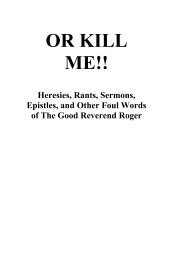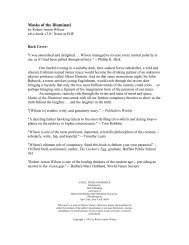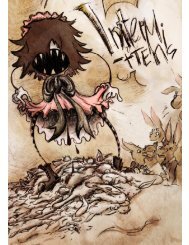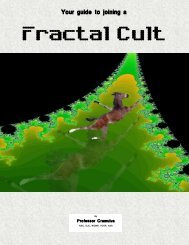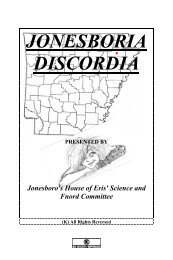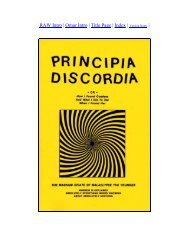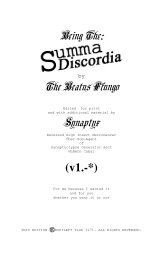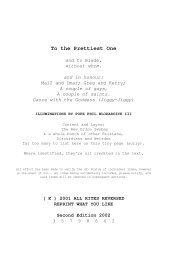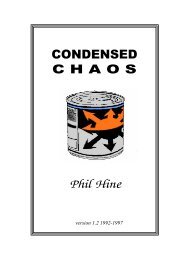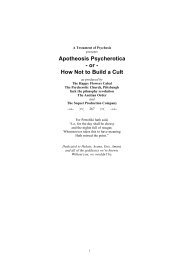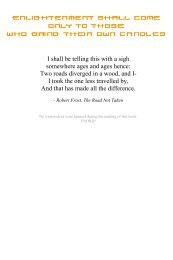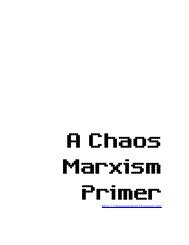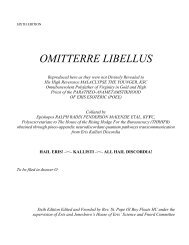Coincidance - Principia Discordia
Coincidance - Principia Discordia
Coincidance - Principia Discordia
Create successful ePaper yourself
Turn your PDF publications into a flip-book with our unique Google optimized e-Paper software.
COINCIDANCE 55<br />
As bright Apollo's lute, strung with his hair;<br />
And when Love speaks, the voice of all the gods<br />
Make heaven drowsy with the harmony<br />
-is not mere pretty language, as such things usually are in Shakespeare's<br />
countless imitators. It is a heretical statement, following Bruno's sonnets<br />
and the tradition of Eleanor of Aquitaine, boldly declaring the path of the<br />
lover superior to that of the soldier or the ascetic. As Francis Yates suggests,<br />
it is even possible that Prospero the Magician in The Tempest is also modeled<br />
on Bruno's magico-Hermetic practices, which involved quite a bit of the old<br />
Cathari-Templar-troubadour tradition of sexual occultism.<br />
Ezra Pound, the modern poet who has given the most careful attention to<br />
historical research on the evolution of these notions, explains in somewhat<br />
guarded language (he was writing for the prudish English public in 1933):<br />
They [the troubadours] are opposed to a form of stupidity not limited to<br />
Europe, that is, idiotic asceticism and a belief that the body is evil ...<br />
The senses at first seem to project a few yards beyond the body ... [in] a<br />
decent climate where a man leaves his nerve-set open, or allows it to tune in<br />
to its ambience, rather than struggling, as a northern race has to for<br />
self-preservation, to guard the body from assaults of weather. . . .<br />
He declines, after a time, to limit reception to his solar plexus. The whole<br />
thing has nothing to do with taboos and bigotries. It is more than the simple<br />
athleticism of mens sana in corpore sano. The concept of the body as perfect<br />
instrument of the increasing intelligence pervades. . . .<br />
We appear to have lost the radiant world where one thought cuts<br />
through another with clean edge, a world of moving energies... magnetisisms<br />
that take form, that are seen, or that border the visible, the matter of Dante's paradiso,<br />
the glass under water, the form that seems a form seen in a mirror, those<br />
realities perceptible to the sense . . . untouched by the two maladies, the<br />
Hebrew disease, the Hindoo disease, fanaticisms and excess that produce<br />
Savonarola. ... *<br />
John Donne, who may have influenced English romantic poetry almost as<br />
much as Shakespeare, attended Oxford while Bruno was lecturing there<br />
and seems to have picked up some of the Nolan's doctrines. The fact that<br />
Donne's poems often have double and triple meanings, concealed jokes and<br />
Hidden symbolism is a critical commonplace, but this has not usually been<br />
* Literary Essays of Ezra Pound (New York: New Directions, n.d.) In The Spirit of Romance, with<br />
roore clarity but equal caution, Pound grants that what was involved was a yoga utilizing<br />
the opposite polarities of male and female." De Rougemont in love in the Western World<br />
leaves no doubt that it was classic Tantric yoga, prolonging the sex act into a trance in<br />
which the "souls" or "magnetisms" are, to some degree, visible.



